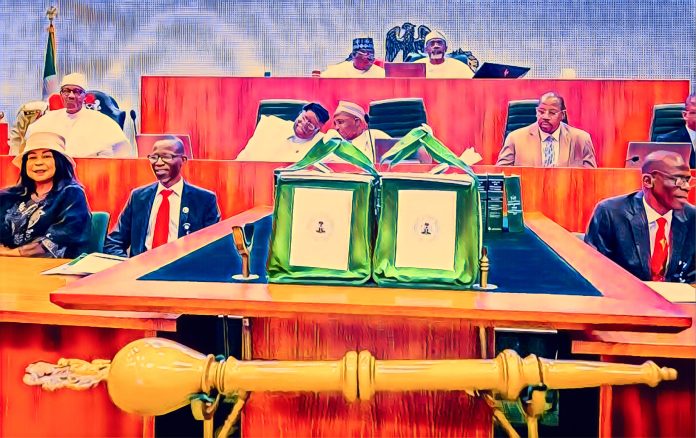KEY POINTS
- In 2025 FG and 21 states budget N3.846 trillion for healthcare.
- Allocations are below WHO’s 13 percent and AU’s 15 percent milestones.
- Kano State was top with 16.50 percent, only six states met the AU health target.
Nigeria’s 2025 budget of N63.898 trillion is made up of healthcare budgets allocated by FG and 21 of the 36 states, which have set aside N3.846 trillion.
It accounts for only 6.02 percent of the total budget, which falls far short of the 13 percent that the World Health Organisation (WHO) recommends and the 15 percent target set in the 2001 Abuja Declaration.
Of the 33 states that announced the 2025 state budgets, only 21 had information detailing that of healthcare funding. However the remaining three states, Imo, Kwara and Rivers, have yet to unveal their budges.
In its national budget that is over N47.9 trillion, the Federal Government allocated N2.48 trillion or 5.18 percent to healthcare, far below the global benchmark.
This low allocation is now being seen as betraying faith in the government’s ability to attend to some of Nigeria’s pressing healthcare challenges, including poor medical infrastructure, poor health insurance coverage, and insufficient medical manpower.
Six states only qualify to meet WHO, AU health funding benchmarks
18 out of the 21 states that announced their healthcare allocations failed to meet 13 percent WHO benchmark or the 15 percent Abuja Declaration target. These states are:
– Kano – 16.50 percent
– Kaduna – 16.07 percent
– Borno – 15.39 percent
– Benue – 15.09 percent
– Abia – 15 percent
– Ogun – 13 percent
The 13 percent healthcare allocation figure set as target by the WHO was exceeded by these states, top on the list are Kano and Kaduna.
Some other states fell far short though, providing less than 5 percent of their overall budget to healthcare. The states with the lowest allocation percentages for healthcare include:
– Bayelsa – 2.77 percent
– Delta – 3.12 percent
– Cross River – 4.22 percent
– Enugu – 4.72 percent
The question is, how committed are the state governments to improving their healthcare delivery.
According to observers, poor funding could aggravate the country’s health problems, among them acute shortage of healthcare workers, high maternal mortality rates and limited access to quality healthcare.
Healthcare allocation break downs by key states
A number of states reported how much was allotted for healthcare. In Abia, the health sector was allocated 15 percent, amounting to N38.6 billion, in a proposed budget of N750.28 billion.
Furthermore, out of its total of N607.99 billion, Anambra set aside N57.1 billion for healthcare, which represents 9.39 percent.
Of the N971.8 billion budget, Enugu allocated N45.016 billion to healthcare comprising 4.72 percent. For 2025, Lagos proposed N3.005 trillion; N204.005 billion is earmarked for healthcare, which is 6.79 percent.
Other allocations are Ondo (7 percent of N655.23 billion), Oyo (8.76 percent of N678.08 billion) and Borno (15.39 percent of N584.76 billion).
Second is Gombe that allocated to healthcare is N32 billion from its N320.11 billion budget, representing 10 percent; while Bayelsa allocated N19.1 billion from its N689.4 billion budget, representing 2.77 percent for healthcare, which makes it the lowest healthcare allocation among the states.
Low healthcare funding and its Implications to Nigeria
On the contrary, such low allocation of healthcare funds have been criticized as being short of the 15 percent target for Abuja Declaration and WHO’s 13 percent benchmark.
Healthcare experts have warned that inadequate funding could lead to:
No access to healthcare for vulnerable communities.
– Mortality rates are increased because of underfunded maternal and child health services.
– Insufficient medical infrastructure, medical equipment and life saving drugs.
Since there was brain drain and people who work in the healthcare sector were leaving for better opportunities elsewhere.
With the Federal Government allocating ₦5.18 percent to healthcare, some of which the states allocate below 5 percent, the health sector will likely continue to struggle with funding into the year 2025. Despite Nigeria’s commitment to global health targets, and efforts to achieve Universal Health Coverage (UHC), this is.
Conclusion
Furthermore, of the N63.898 trillion total budget, healthcare allocations from the Federal Government and 21 states total N3.846 trillion, this is 6.02 percent of the total budget.
Some states, including Kano, Kaduna and Benue states, met the WHO and AU benchmarks for their coverage rates but most other states, including the Federal Government, did not.
As Nigeria battles health challenges, including rising maternal mortality rates, poor health infrastructure, and a flight of healthcare professionals, experts say the country needs more investment in the health sector.
Over 33 states have announced their 2025 budgets, 21 have allocated healthcare, and there is a question of transparency and also commitment of states to the well being of their citizens.
To address these gaps, health advocates have also called for:
– 15 percent allocation to It had been fully compliant to the declaration of Abuja (15percent) to healthcare.
Is that increased transparency in state and federal budgets, to be able to see the spending on healthcare?
– A set of improved accountability and monitoring mechanisms to ensure that funds are effective.
Nigeria needs to undertake particularly for Nigeria to meet its national health goals and fulfil its international obligations, in terms of how to increase funding of health care and how to use it effectively.



